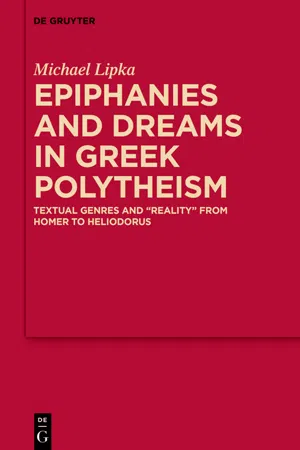
Epiphanies and Dreams in Greek Polytheism
Textual Genres and 'Reality' from Homer to Heliodorus
Michael Lipka
- 328 Seiten
- English
- ePUB (handyfreundlich)
- Über iOS und Android verfügbar
Epiphanies and Dreams in Greek Polytheism
Textual Genres and 'Reality' from Homer to Heliodorus
Michael Lipka
Über dieses Buch
While modern students of Greek religion are alert to the occasion-boundedness of epiphanies and divinatory dreams in Greek polytheism, they are curiously indifferent to the generic parameters of the relevant textual representations on which they build their argument. Instead, generic questions are normally left to the literary critic, who in turn is less interested in religion. To evaluate the relation of epiphanies and divinatory dreams to Greek polytheism, the book investigates relevant representations through all major textual genres in pagan antiquity. The evidence of the investigated genres suggests that the 'epiphany-mindedness' of the Greeks, postulated by most modern critics, is largely an academic chimaera, a late-comer of Christianizing 19th-century-scholarship. It is primarily founded on a misinterpretation of Homer's notorious anthropomorphism (in the Iliad and Odyssey but also in the Homeric Hymns ). This anthropomorphism, which is keenly absorbed by Greek drama and figural art, has very little to do with the religious lifeworld experience of the ancient Greeks, as it appears in other genres. By contrast, throughout all textual genres investigated here, divinatory dreams are represented as an ordinary and real part of the ancient Greeks' lifeworld experience.
Häufig gestellte Fragen
Information
Index of Ancient Sources
- 1 Literary sources
- Achilles Tatius
- 1.3:
- 1.4:
- 2.12:
- 3.6:
- 3.6˗8:
- 3.17:
- 4.1:
- 5.3 f.:
- 5.4:
- 5.5:
- 5.8:
- 7.12:
- 8.18:
- Adespota Comica
- fr. 215 CGF:
- fr. 1104 (PCG VIII.422):
- Aeschylus
- Agamemnon
- 111˗137:
- 160˗175:
- Choephori
- 32˗41:
- 523˗539:
- 540˗550:
- 928 f.:
- Eumenides
- 1˗33:
- 19:
- 46˗59:
- 162 f.:
- 163:
- 198˗205:
- 198˗234:
- 312:
- 322:
- 350:
- 416:
- 465:
- 470˗489:
- 594˗596:
- 614˗621:
- 681˗710:
- 721 f.:
- 745:
- 778 f.:
- 804˗807:
- 808 f.:
- 851˗857:
- 916˗926:
- 1021˗1047:
- Persae
- 176˗199:
- 205˗210:
- 518˗520:
- Fragments
- frs. 23 f.:
- fr. 61:
- fr. 70:
- fr. 169:
- frs. 279˗280a:
- Agamemnon
- [Aeschylus]
- Prometheus Vinctus
- 8˗11:
- 29˗31:
- 50:
- 96 f.:
- 149˗151:
- 196˗241:
- 209 f.:
- 266:
- 310:
- 324:
- 389:
- 402˗405:
- 515˗525:
- 645˗672:
- 734˗737:
- 756:
- 761˗777:
- 908˗940:
- 944˗1093:
- 947˗952:
- 955 f.:
- Prometheus Vinctus
- Ameipsias
- fr. 4:
- Anaxandrides
- fr. 28:
- Antipater
- Del Corno 1969, 75, 156 f.:
- Antiphanes
- fr. 189:
- Apollonius Rhodius
- 1.22:
- 1.1310˗1331:
- 2.537˗548:
- 2.598˗603:
- 2.611˗614:
- 2.669˗719:
- 2.911˗929:
- 3.66˗73:
- 3.275:
- 3.275˗298:
- 3.596˗600:
- 3.616:
- 3.616˗635:
- 3.618.:
- 3.648˗652:
- 3.927˗946:
- 3.938˗947:
- 3.1212˗1224:
- 4.640˗644:
- 4.660˗752:
- 4.664˗669:
- 4. 723 f.:
- 4.852˗855:
- 4.861˗864:
- 4.912˗919:
- 4.933˗938:
- 4.1305˗1379:
- 4.1541˗1585:
- 4.1547˗1553:
- 4.1602˗1619:
- 4.1706˗1713:
- 4.1731˗1764:
- 4.1732˗1745:
- Appian
- Bella Civilia
- 4.17.134:
- Bellum Mithridaticum
- 27:
- Bella Civilia
- Aristides, Publius Aelius
- 2.39:
- 18.116:
- 27.2:
- 37.1:
- 38.1 f.:
- 40.22:
- 41.1:
- 42.11 f.:
- 43.6:
- 47.11˗13:
- 47.16:
- 47.18:
- 47.42:
- 47.58:
- 47.71:
- 48.1˗9:
- 48.2:
- 48.18:
- 48.24:
- 48.32:
- 48.41 f.:
- 48.9:
- 49.12:
- 49.13:
- 49.20˗22:
- 49.23:
- 49.46:
- 49.46 f.:
- 49.47: ...
- Achilles Tatius
Inhaltsverzeichnis
- Title Page
- Copyright
- Contents
- Foreword and Acknowledgements
- Introduction
- Epic
- Narrative Hymns
- Didactic Poetry
- Sappho’s Lyric
- Drama
- Historiography
- Historical Biography
- Periegesis
- Autobiography
- Epigraphic Genres
- Erotic Novel
- Medical and Philosophical Treatises on Dreams
- Neoplatonic Treatises
- Magical Recipes
- Conclusions
- General Index
- Index of Ancient Sources